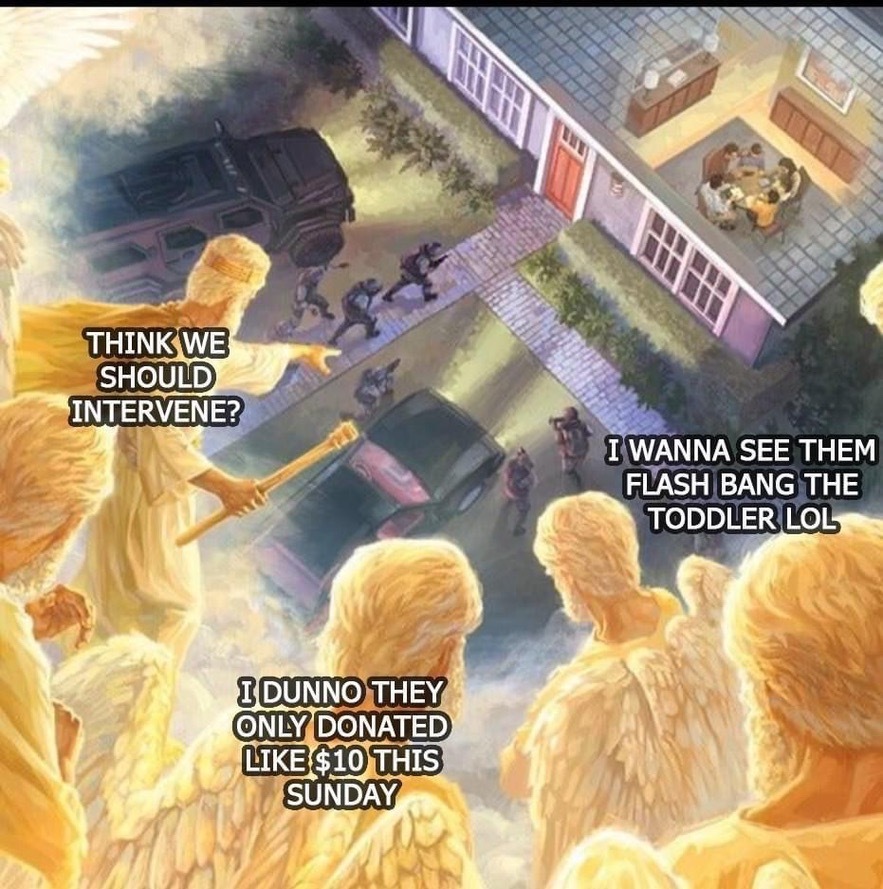this post was submitted on 10 Nov 2023
1206 points (97.0% liked)
Memes
45636 readers
1156 users here now
Rules:
- Be civil and nice.
- Try not to excessively repost, as a rule of thumb, wait at least 2 months to do it if you have to.
founded 5 years ago
MODERATORS
you are viewing a single comment's thread
view the rest of the comments
view the rest of the comments

The point about being omnipotent vs free will is... if he does ANYTHING to change our fate, he's corrupting free will, which is supposed to be our greatest gift.
The entire concept of an omniprescient and all powerful being is nonsensical as described by Christians. A being LITERALLY CANNOT be all knowing, all kind, and omnipotent. Not if our reality is involved.
That is why there is so much debate over the nature of god and "good". As described, it is literally impossible, so it becomes increadibly subjective.
Morals are subjective, and so is God.
Strictly talking the logic of it, if you're omnipotent, then you have the power do do anything, and that includes the power to do flagrantly self contradictory things, defy logic and still be logically consistent.
The "if you're omnipotent" part is a pretty big "if", but it's not inconsistent to say that "anything" includes the ridiculous.
I mean... Not really. Paradoxes don't actually exist. Causality itself would fail to work if literally inconsistent things could be magically made consistent. It's fundamentally not how the universe works. Literally. What you ask for could exist, but not in a universe that behaves like ours. It is fundamentally incompatible with what is observed.
Yes, completely and fundamentally incompatible. Even if God could start up a billion universes with a billion rules ... ours doesn't work like that. It's like a game character saying, "yea well the devs could totally make this RPG a FPS game!"
Is the possibility true? Yes. Though for no reason the game character will ever comprehend nor be able to ever observe. It is fundamentally a pointless point that adds no new information to the equation.
We're discussing logical consequences of a thing, not if the thing is possible in the first place.
You don't have to talk logical consistency to rule out "all knowing and all powerful" if you're just looking at how things work in reality.
In reality, you can't be all powerful or all knowing. Done, end of story. It's impossible on the face of it.
In the hypothetical where something can be all powerful, then the power to do whatever, even in a universe that behaves like ours does, is consistent.
The power to do anything includes the absurd, inconsistent, and contradictory.
Logic requires cause and effect. If you break cause and effect, logic means nothing.
If you keep logic, then again: Paradoxes don't actually exist. At the end of the day, something is true or it's not. If you're dealing with something both true and not true, you are literally and quite directly dealing with something unresolved. We fundamentally do not observe unresolved things.
It is conceptually, definitionally, not compatible with observed reality. "Observed reality" literally cannot reference such things. The question itself is nothing but a thought experiment that far too many people fail to execute.
Can an omnipotent god microwave a burrito so hot that even he cannot eat it?
Yep, omnipotence is logically impossible. But try tell that a christian. That's my point, the christian god is logically impossible.
Save yourself the trouble; free will as we normally conceive of it is entirely an illusion.
To be fair, if he sets the board and knows the dice rolls he can create a universe that has both free will and only peeps that go to heaven.
Yes, but such a universe is still fundamentally incompatible with Christian (and most other) religious teachings.
There would be absolutely NO point in praying or asking for help in a universe with absolute free will, yet that is exactly what Christians (and many others) teach. It shows up all over in how they treat others and civil policy.
It's why they're so pro punishment: You make a choice to do bad things, you had free will to choose not to, so you must be bad. It's not completely broken logic that they use, but it is absolutely not a self-consistent set of rules.